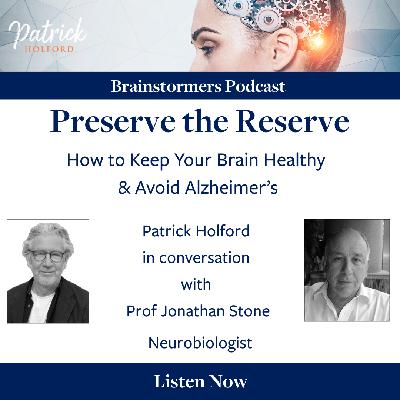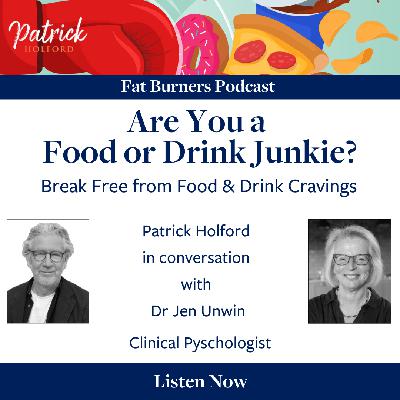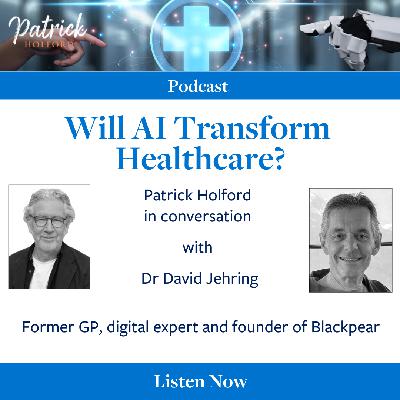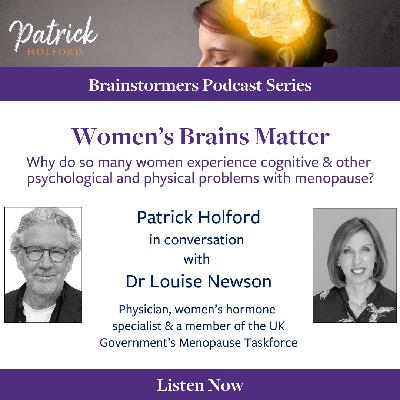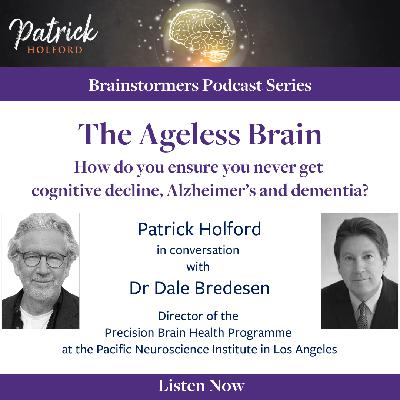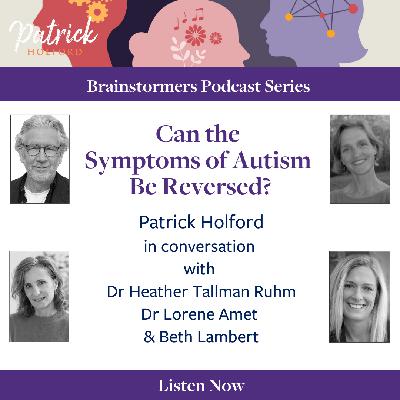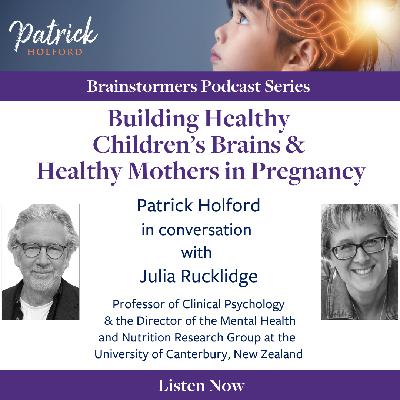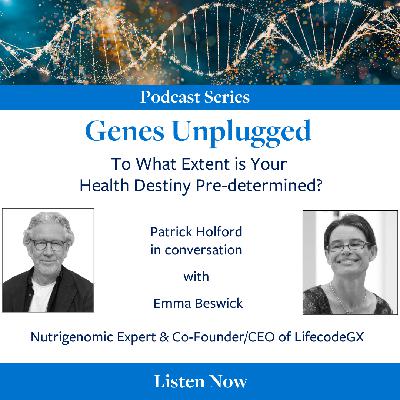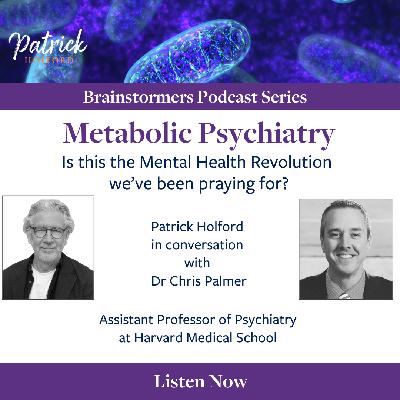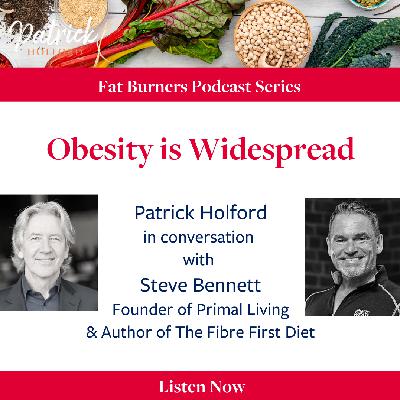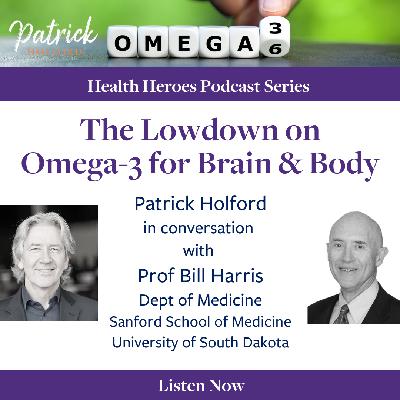Discover Patrick Holford: Simple Wisdom for a Healthy Life
Patrick Holford: Simple Wisdom for a Healthy Life

Patrick Holford: Simple Wisdom for a Healthy Life
Author: patrickholford
Subscribed: 87Played: 1,366Subscribe
Share
© Copyright 2020 All rights reserved.
Description
”With a lot of fake news and confusion about the best advice for nutrition and optimum health, my series of podcasts focus on scientific research and latest developments - in discussion with leading health experts - giving you ’real’ information.” Patrick Holford is a Nutrition Expert and Founder of the Institute for Optimum Nutrition
61 Episodes
Reverse
Happy New Year!
As we head into 2026, what actually matters when it comes to protecting your health - and what’s just noise?
In this month’s podcast, I share my top health predictions for the year ahead and the habits truly worth adding to your New Year Resolutions. We go behind the headlines to unpack health politics, misinformation, and some uncomfortable truths - from vaccines and new Alzheimer’s drugs to how nutritional medicine is really moving forward.
In this episode, you’ll discover:
The five most important actions you can take to reduce your risk of cancer
Why vitamin C, when used correctly, may be more effective than a flu vaccine
The latest breakthroughs in antioxidants and anti-ageing science—including one powerful antioxidant you may not have heard of
If your goal this year is clarity, resilience, and long-term health - not fads or fear- this episode will give you a strong head start.
Wishing you a happy, healthy, and well-informed New Year.
Visit my website www.patrickholford.com and sign up to my E-News to stay informed.
My guest today is sleep expert Dr Greg Potter. He is a recent addition to Food for the Brain’s scientific advisory board and helps individuals and organisations sustainably improve their health and performance.
He’s an expert in sleep, circadian rhythms, nutrition, and metabolism and in this podcast we are going to find out what sleep is all about and how to optimise your sleep for better health for both mind and body. Greg is a Sleep Coach at the London Psychiatry Clinic.
Read more on Sleep my website.
My next guest is neurobiologist Professor Jonathan Stone, a leading light in biological science in Australia, who served as Secretary in the biological sciences in the Australian Academy of Science for several years and is recipient of numerous science awards.
In his research papers, over 200 in all, he asks important questions. For example, why are we designed to produce the toxic amyloid protein found in the brains of those with dementia?
In this conversation we are going to dig deeply into the ways the brain, our neural network, protects itself from damage and in so doing understand how to protect our brains from disease. This biological detective work also reveals the kind of diet and food components that protect us and why.
This enlightening podcast is for anyone with a brain and a heart, as Professor Stone tackles that key area of blood and hence nutrient supply to the brain. As Hippocrates said “What is good for the heart is good for the mind.”
Visit my website for more on brain health or see my books Upgrade Your Brain and Alzheimer's: Prevention is the Cure. Do take the Food for the Brain Cognitive Function Test.
If you keep meaning to change your food or drink habits but fail, you might be stuck in an ‘addiction’ trap. My guest in this podcast is clinical psychologist Dr Jen Unwin, an expert in food addiction, campaigning to get it recognised in the same way that alcohol addiction is.
You’ll learn the six tell-tale signs that you’re getting hooked. The ever-increasing prevalence of addiction to junk food, sugar and carbs, as well as alcohol and coffee, keeps many people trapped in a cycle of fatigue, weight gain, poor sleep and, ultimately metabolic diseases from diabetes to dementia.
If you’d like to break free from all food and drink cravings or understand how addiction is a major drag factor in health transformation, and how to deal with it, listen in.
See Collaborative Health Community (CHC)
See Dr Jen Unwin's book The Fork in the Road: A Hopeful Guide to Food Freedom
Visit my weight-loss topic and addiction topic on my website.
For more on addiction see my book - How to Quit Without Feeling S**t.
Artificial intelligence is going to have a bigger impact than the ‘digital revolution’ that gave us computers and smartphones. As conventional healthcare crumbles, and disease, especially mental and neurological disorders, accelerate as a direct consequence of big pharma and big food influence, will AI have the ability to change the paradigm for better or worse?
Former GP Dr David Jehring, digital expert and founder of Blackpear, whose software is used extensively within the NHS, is a pioneer in the use of AI for personalised health transformation. How can AI help us and what does the near and far future look like in an AI-centric world? Things are going to change very fast. Now is the time to think forward.
My guest today is Dr Louise Newson. She is a physician, women’s hormone specialist and member of the UK Government’s Menopause Taskforce. She is also an award-winning doctor, educator, and author, committed to increasing awareness and knowledge of perimenopause and menopause.
Described as the ‘medic who kickstarted the menopause revolution’, she has empowered a generation of women to have a greater understanding, choice and control over their treatment, bodies and mind.
I’ll be talking about her latest book - ‘The Definitive Guide to the Perimenopause and Menopause’.
You can take part in Alzheimer's Prevention Day on Tuesday 20 May. Find out more about what you can do to help prevent cognitive decline, dementia and Alzheimer's, and share it with friends and family.
Visit my website for more on brain health - www.patrickholford.com and read my books ‘Alzheimer’s: Prevention is the Cure’ and How to Balance Your Hormones.
My guest today, is neurologist Dr Dale Bredesen, an expert in the mechanisms of neurodegenerative diseases and author of the book ‘The End of Alzheimer’s’, which created quite a stir when it came out.
Now, his latest book ‘The Ageless Brain’, takes the conversation further. I’ve read his book and he’s read my latest, ‘Alzheimer’s: Prevention is the Cure’, so we have a rich conversation comparing approaches and new frontiers.
He is director of the Precision Brain Health Programme at the Pacific Neuroscience Institute in Los Angeles.
You can take part in Alzheimer's Prevention Day on Tuesday 20 May. Find out more about what you can do to help prevent cognitive decline, dementia and Alzheimer's, and share it with friends and family.
Find out more about brain health on my website - www.patrickholford.com
What is autism? Is it truly on the rise, along with the broader concept of ‘neurodivergence’? With one in six children now identified as having special educational needs, could this increase be due to over-diagnosis, genetic factors, or something more?
In this episode, I’m joined by three pioneers in the field—experts with extensive experience working with thousands of children diagnosed with autism. Together, we uncover the true scale of the issue and explore why our children's mental and physical health is under attack.
Joining me are:
Dr. Lorene Amet – Director of The Lauriston Centre in the UK, holding a DPhil in Molecular Biology from the University of Oxford and a Master’s in Autism Education. She has conducted postdoctoral research at Princeton and Edinburgh universities.
Beth Lambert – Founder of Documenting Hope, a non-profit dedicated to children's health. She’s a teacher and the author of A Compromised Generation: The Epidemic of Chronic Illness in America’s Children, as well as co-author of Brain Under Attack.
Dr. Heather Tallman Ruhm – A board-certified physician with a Master’s degree in Public Health Policy. She has over a decade of experience as a college professor and serves as a medical advisor for Documenting Hope.
Together, we dive deep into what’s beneath the surface - examining why our children's well-being is increasingly under threat.
Further Information
Read more in my book Upgrade Your Brain and on my website www.patrickholford.com
To what extent is a child’s mental health set in pregnancy? What can women do in pregnancy to ensure optimal mental health for their child? Also, what happens to women’s brains and mental health when their nutrition is sub-optimal in pregnancy? How can we help children and teenagers to achieve their full potential for mental health?
In this podcast, I'm speaking to Julia Rucklidge, Professor of Clinical Psychology in the Department of Psychology and the Director of the Mental Health and Nutrition Research Group at the University of Canterbury in New Zealand.
Learn more on my website - nutrition for Children's Health and Pregnancy as well as my books Optimum Nutrition for your Child and Optimum Nutrition Before, During and After Pregnancy.
To what extent is your health destiny pre-determined? Is it nature or nurture – what you eat and how you live that determines your health history?
My guest in this podcast is a specialist in nutrigenomics. That is the field of rich interactions between your genes and your environment.
Emma Beswick is not only a nutrigenomic expert but also a graduate from the Institute for Optimum Nutrition so she knows her stuff about nutrition too and is very much hands on, running one of the best gene testing companies in this field: LifecodeGX.
In this podcast she demystifies genes and explains how they work, how we can identify our genetic uniqueness and the direct knock on effect that has on your personal optimum nutrition.
Go to my website for more information on nutrition. Sign up to my E-News on the home page of my website at www.patrickholford.com to receive news updates.
Do follow my podcast channel to be informed of new podcast as they are released. Share with friends and family to help them achieve optimum health.
Dr Christopher Palmer is a Harvard psychiatrist and researcher working at the interface of metabolism and mental health. He is an Assistant Professor of Psychiatry at Harvard Medical School and the Founder and Director of the Metabolic and Mental Health Program and Director of the Department of Postgraduate and Continuing Education, both at Harvard and at the McLean Hospital.
He is author of the best-selling book, Brain Energy, in which he argues that mental disorders are metabolic disorders impacting the brain, and is leading the way to a paradigm shift in psychiatry towards new ways of understanding and treating mental health.
Go to my website for more information on nutrition and mental health as well as the ketogenic diet. See also my book Upgrade Your Brain. Sign up to my E-News at www.patrickholford.com to receive news updates.
The latest iteration of the highly influential Lancet Commission on dementia prevention, authored by numerous professors from around the world, led by University College London’s psychiatry Professor Gill Livingston has, for the third time, ignored the hardest hitting evidence for homocysteine lowering B vitamins, misrepresented the science on omega-3 and concluded that the evidence for ‘unhealthy diet’ didn’t meet their high bar for inclusion as a modifiable risk factor.
Several eminent professors are up in arms and have written to the Lancet. In this podcast I interview three of them – Professor Joshua Miller, Professor of Nutritional Science at Rutgers University; omega-3 expert Professor William Harris from the Fatty Acid Research Institute (FARI) and Professor Richard Johnson from Colorado University’s School of Medicine - to explore how the establishment continue to side-line nutrition.
Read more on Alzheimer's, Dementia and brain health on my website.
Read the Lancet report.
More about Food for the Brain.
I’m talking to Steve Bennett, author of The Fibre First Diet, a book which proposes that simply re-ordering the foods you eat can trim your waistline and prevent diseases.
We get under the hood of what’s really going on and how to gain control of your weight and health without feeling deprived. We will explore insulin resistance and how to reverse it, what really drives hunger, quick solutions to cut your cravings and why not all fibres are created equal. Also, the Japanese fibre that doctors prescribe to help reverse diabetes.
Find out about his book The Fibre First Diet.
Find out more on weight-loss and blood sugar balance on my website.
Keeping your brain young is a science. Ageing happens because of oxidation (think wrinkly skin). Nowhere is there more oxidation activity than the brain because your brain uses more energy than any other organ and generates more oxidants.
There are 7 key antioxidants which, together recycle each other. These are vitamin C, E, glutathione, anthocyanins, co-enzymeQ10 and alpha lipoic acid.
There’s a second line of defence involving B vitamins and minerals such as selenium and zinc. In this podcast I’ll be talking with the antioxidant expert Associate Professor David Vauzour, Dr Filip Van Hulle, a leading expert in CoQ10 and brilliant analytical chemist Dr Konrad Kowalski who has developed a simple test to find out how your brain is ageing and what to do about it.
What anti-ages your brain also anti-ages your body. Listen to this podcast to add years to your life and life to your years.
Find out more about how to Upgrade Your Brain.
In this podcast, I bring the three top scientists who know more about fats and the brain than any others - Professor Michael Crawford, visiting Professor at Imperial College London and head of the Institute of Brain Chemistry and Human Nutrition, Professor William Harris from the Fatty Acid Research Institute (FARI) and neuroscientist Dr Simon Dyall, a director of of the International Society for the Study of Fatty Acids and Lipids - to get inside our brains.
I’m most interested in the point of disagreement, the contradictions, the evidence that doesn’t fit the model. So often, by stirring things up we learn something new. Is it all about omega DHA? So why is evidence for EPA sometimes working even better for mental health? What about phospholipids? Is it all about choline, which is just one of five phospholipids. Where does vitamin D, a fat based hormone fit in? These are some of the topics we explore.
Find out more about the Upgrade Your Brain campaign on my website.
My guest today is Dan Kittredge, who knows more about what makes food nutritious than anyone I know.
Dan Kittredge has been an organic farmer for more than 30 years and is the founder and executive director of the Bionutrient Food Association (BFA), a non-profit whose mission is to “increase quality in the food supply.”
Known as one of the leading proponents of “nutrient density,” Dan works to demonstrate the connections between soil health, plant health, and human health. Out of these efforts was born the Bionutrient Institute, which has engineered a prototype of a hand-held consumer spectrometer, designed to test nutrient density at point of picking or purchase.
He has decades of experience literally testing growing methods and measuring the nutrient density both in plants and livestock. As people extol the benefits of organic, zero-dig, regenerative farming and the harms of our herbicide and pesticides laden food supply, Dan has actually been measuring and working out what farmers and growers have to do to get the healthiest soil for the healthiest plants.
Not only am I honoured to have Dan as my podcast guest but also he’s coming to our farm in the Black Mountains in June to teach us, and others, how to grow super-nutritious food. See foodforthebrain.org/kittredge-workshop
Ask the man in the street what’s driving Alzheimer’s and they’ll probably say a third is in the genes. Or that it’s just what happens when you age. Neither of these statements are true.
Alzheimer’s is a largely preventable disease and my guests today are tackling the two fundamental questions.
Firstly, what are the positive and negative behaviours – diet, lifestyle, environment – that prevent and drive dementia?
And secondly, how do you change those behaviours.
In today’s podcast I talk with Assistant Professor Tommy Wood, from the University of Washington about the what, then Dr Kristina Curtis, a behavioural scientist and honorary lecturer at the University College London who heads the Applied Behaviour Change team, about the how of behaviour change.
Go to my website for more information on nutrition and mental health See also my book Optimum Nutrition for the Mind. In April I'll be publishing my new book Upgrade Your Brain - sign up to my E-News at www.patrickholford.com to receive news updates and book availability.
My podcast guest is Dr Georgia Ede, MD, a Harvard-trained, board-certified psychiatrist based in Northampton, Massachusetts, USA.
Her interest in nutrition arose after discovering a new way of low carb ketogenic eating that reversed several bewildering health problems. Her speciality is nutritional and metabolic psychiatry and ketogenic diets. Her passion is empowering people with psychiatric conditions to reduce or eliminate the need for medications by changing how they eat.
But which changes are worth making, and why? That’s both the subject of her new book Change Your Diet Change Your Mind, just out, and this podcast.
Go to my website for more information on ketogenic dieting in the Go Hybrid section and for nutrition and mental health See also my book Optimum Nutrition for the Mind. In April I'll be publishing my new book Upgrade Your Brain - sign up to my E-News at www.patrickholford.com to receive news updates and book availability.
My guest today is Uma Naiidoo who founded and directed the first and only hospital-based program in Nutritional, Lifestyle and Metabolic Psychiatry and is Director of Nutritional and Psychiatry Service at Massachusetts General Hospital and serves on the faculty of Harvard Medical school.
Her books Your Brain on Food and The Food Mood Connection are bestsellers in the US. Here we focus on anxiety and her new book How to Calm Your Mind with Food - out yesterday.
For more on nutrition and anxiety see the Anxiety topic on my website. Also see my book The Stress Cure.
My podcast guest today is a legend in the world of omega-3.
Dr Bill Harris is Professor in the Department of Medicine in the Sanford School of Medicine at the University of South Dakota. He has been a front runner in measuring omega-3 status and developed the omega-3 index, running studies on the effects of omega-3, with more than 300 published pieces of research to date, backed by five National Institutes of Health grants. Perhaps best known for his expertise in relation to omega-3 and heart health.
He obtained his PhD doctorate in Human Nutrition from the University of Minnesota and did post-doctoral fellowships in Clinical Nutrition and Lipid Metabolism with Dr Bill Connor at the Oregon Health Sciences University back in the 1980’s. He has had his finger on the pulse of omega-3 research ever since.
In this podcast, we are discussing his latest study on omega-3 status as a predictor of Alzheimer’s and dementia risk.
Read more about Alzheimer's and Dementia on my website. Also see my book Upgrade Your Brain.




